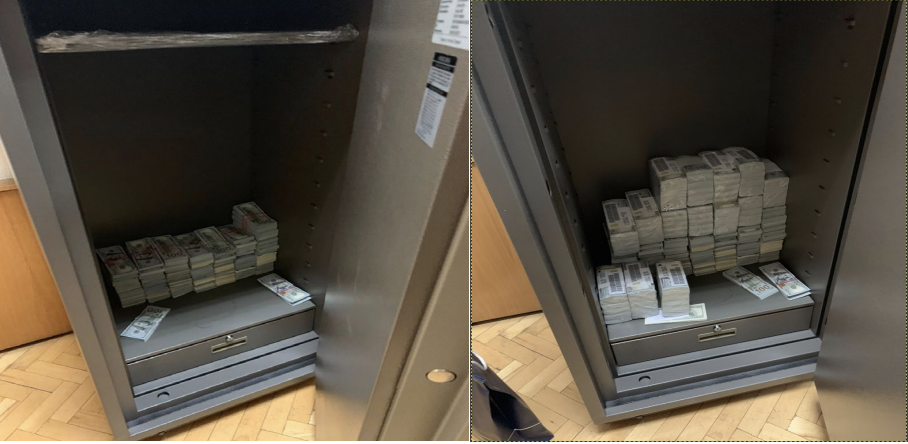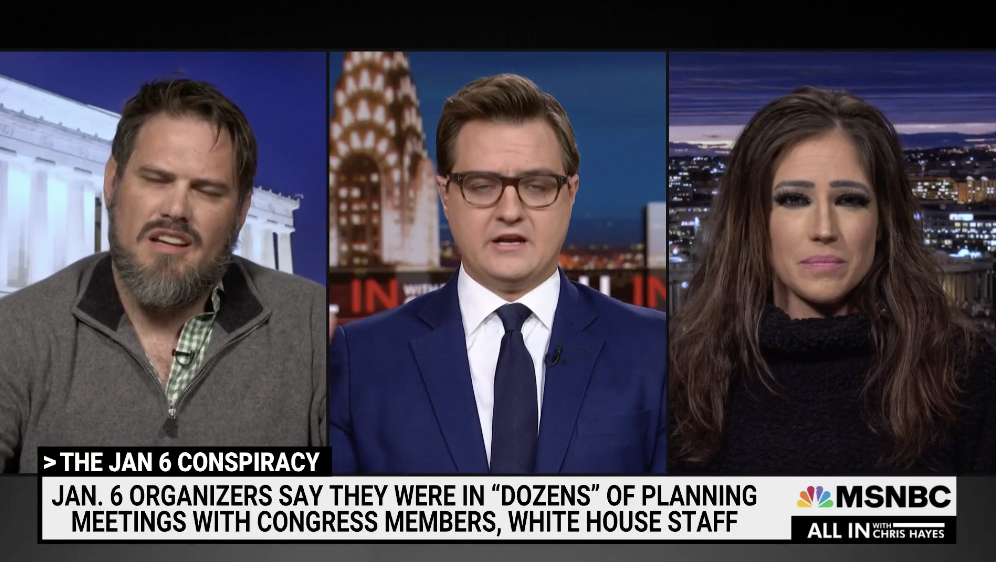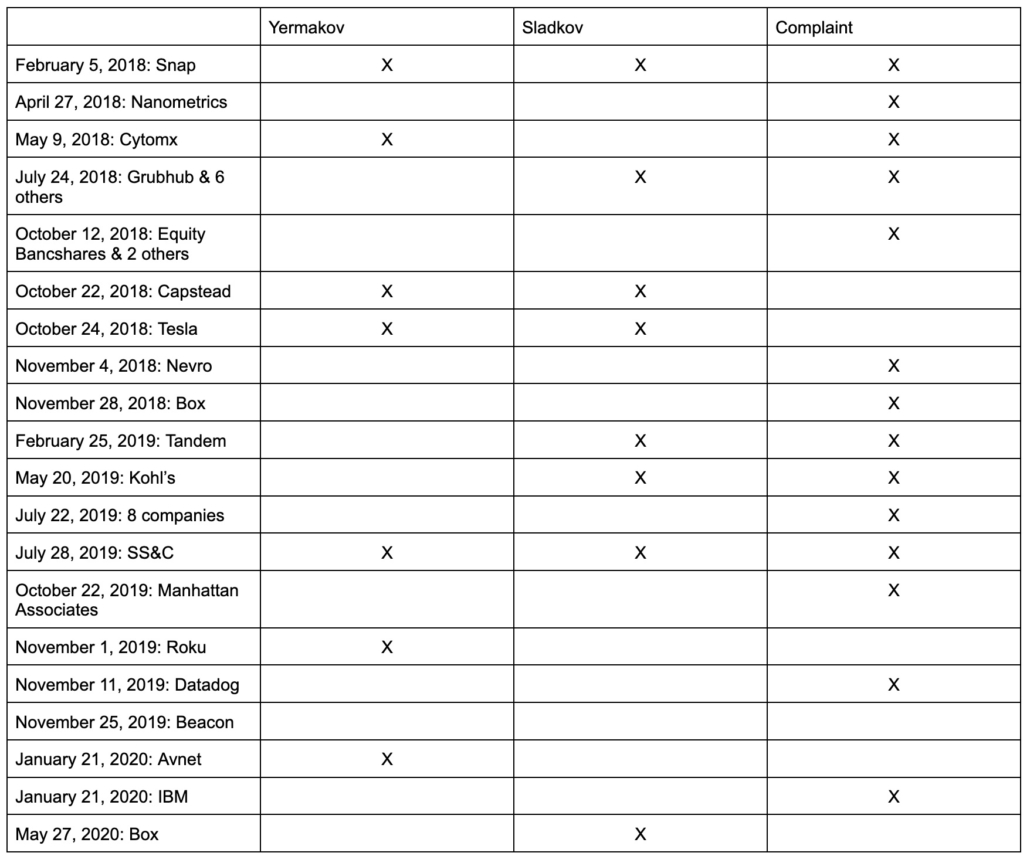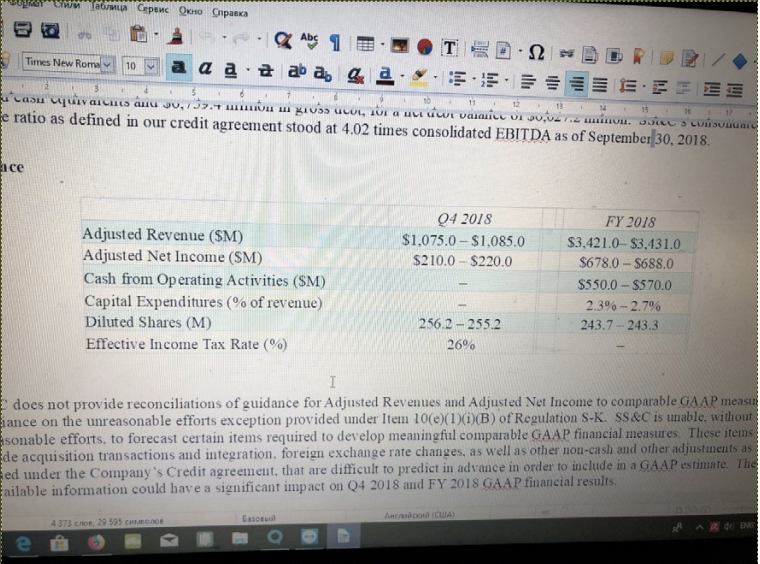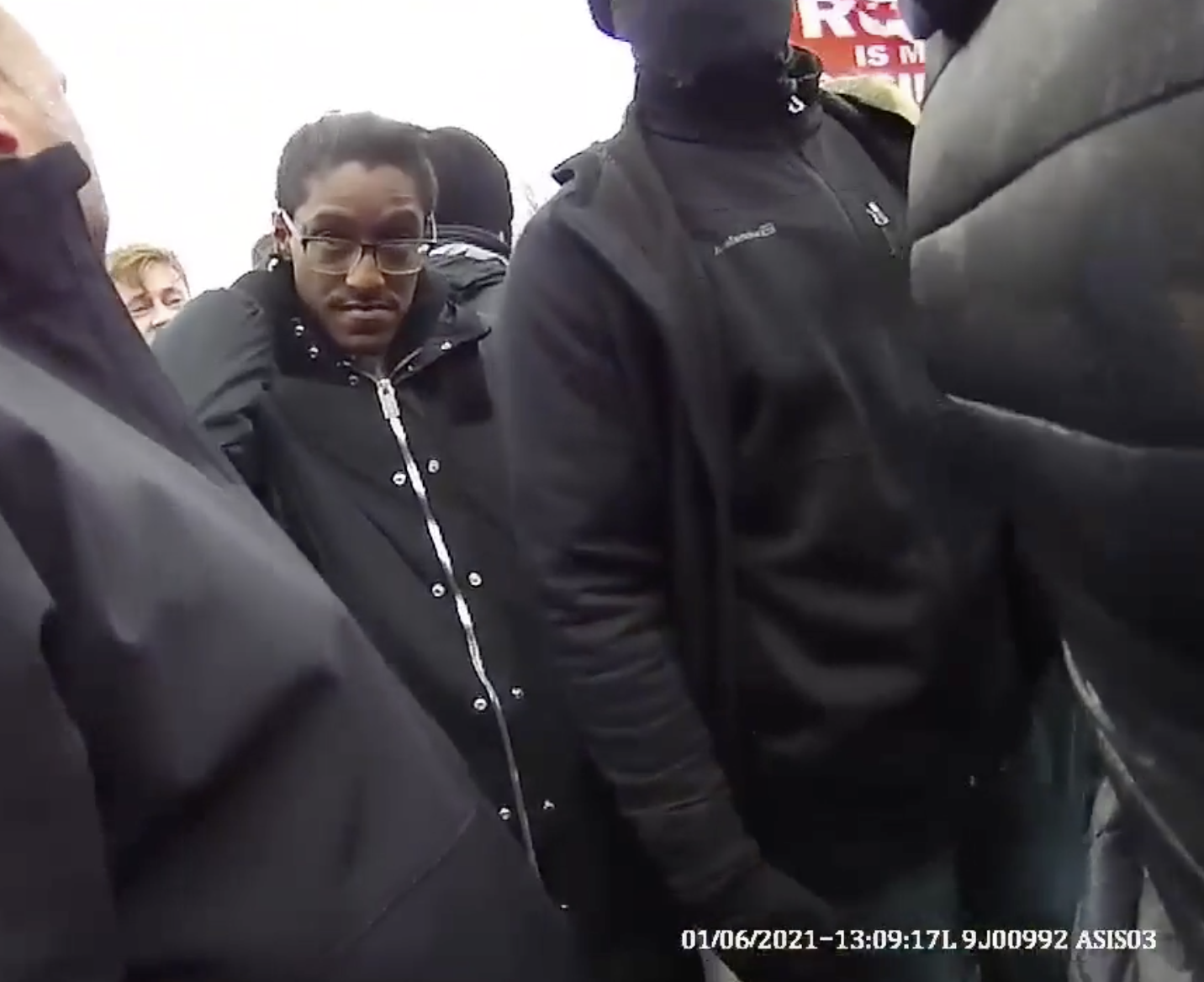For all the whinging about the pace of the various investigations into January 6, DOJ’s investigation has already gotten further into the Roger Stone side of the investigation than the Mueller investigation had by the time Stone testified to the House Intelligence Committee on September 26, 2017. At that point, almost fourteen months into the investigation into which of Trump’s rat-fuckers were coordinating with Russia, Mueller had obtained warrants targeting just Stone’s Twitter and Hotmail accounts.
As Stone acolyte Ali Alexander testifies before the January 6 Committee today, by comparison, just 11 months into the investigation, DOJ is already more than 100 days past the arrest of one of the men Stone and Alexander worked closely with on sowing insurrection, Owen Shroyer.
That makes the feat Ali Alexander is going to try to pull off when he testifies today to the January 6 Commission that much more fraught than what Stone tried four years ago. That’s because DOJ has already debunked some of the lies he plans to tell Congress.
In his prepared statement, which the NYT obtained, Alexander (who was originally subpoenaed because of the way he used covers to obtain multiple permits around the Capitol and incited violence in advance, neither of which he addresses in his statement) claims that he was attempting to de-escalate the riot after it started.
There are a number of videos of my associates and me arriving at the Capitol on January 6 after the violence had begun but in the early stages of the lawbreaking. In those videos, our group can be seen working with police to try to end the violence and lawbreaking. We can be seen yelling and screaming at people to STOP trying to enter the Capitol and STOP violent lawbreaking in general.
I believe those videos have been provided to the committee. If they have not, I will be happy to share them.
While I was actively trying to de-escalate events at the Capitol and end the violence and lawlessness, it’s important to note that certain people were nowhere to be found, including Amy Kremer, Kylie Kremer, and Katrina Pierson; essentially, the Women for America First leadership of the Ellipse Rally that was originally titled the “March for Trump” in their National Park Service permit application. Press reports suggest they may have had their feet up drinking donor-funded champagne in a War Room in the Willard. I don’t know where they were. But they weren’t working with police trying to de-escalate the chaos like I was.
It is my belief there may not have been a problem had that same leadership at the Ellipse event not intentionally removed instructions from the program that were supposed to be included to provide clarity on exactly where to go following the Ellipse event. When I protested the removal of those instructions, I was barred from participating as an organizer at the Ellipse event that preceded the Capitol riot. Ultimately, I was a VIP guest at the Ellipse event.
As a result, civil authority collapsed before the Ellipse Rally was over, before I arrived, and before my event was scheduled to begin.
To clarify: My permitted event at Lot 8 never took place. The “One NationUnderGod”event that Stop the Steal was a part of did not start the chaos. The chaos was well underway before our event was scheduled to begin.
We never held our event. We weren’t allowed to. [bold my emphasis, underline Alexander’s]
When Shroyer attempted to make this very same argument in a motion to dismiss in October, he at least included one (but not the most damning) video along with his argument. Here, having received a subpoena asking for such items, Alexander vaguely waves at videos he assumes the Committee has already received.
As the government’s response to Shroyer’s motion laid out, as Shroyer and Jones and Alexander led mobs to the Capitol even after “civil authority” had, according to Alexander, already “collapsed,” the InfoWars personalities were further riling up the mob.
After hearing that people may have breached the Capitol, [Shroyer], [Alex Jones], and others began leading this large crowd down Pennsylvania Avenue toward the Capitol Building.4 The defendant is encircled in red below with a megaphone, at the front of the crowd.
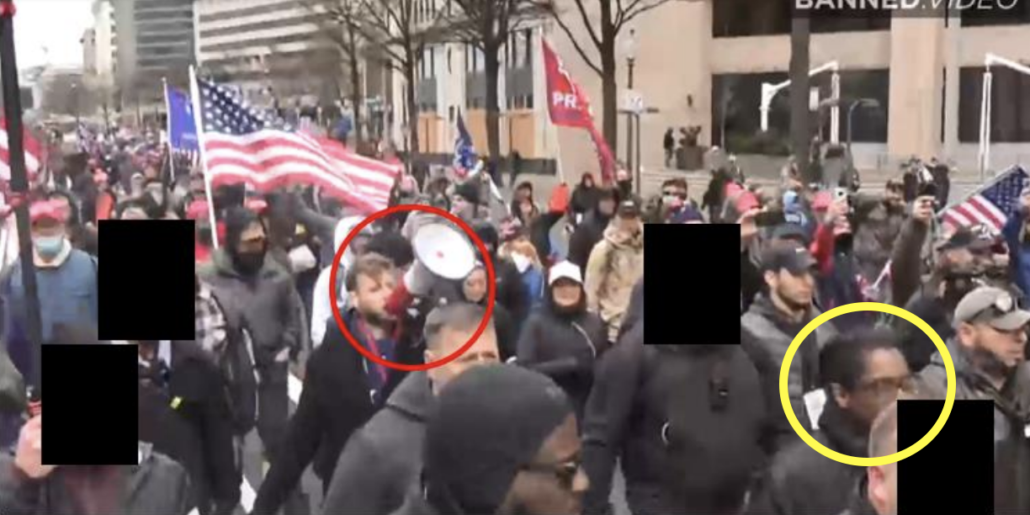
En route, [Shroyer] continued shouting to the crowd walking behind and around him through his megaphone: “The traitors and communists that have betrayed us know we’re coming. We’re coming for all you commie traitors and communists that have stabbed us in the back. You’ve stabbed us in the back one too many times!” He continued, “We will not accept the fake election of that child-molesting Joe Biden, that Chinese Communist agent Joe Biden, we know where he belongs and it’s not the White House!” The defendant then led chants of “Stop the steal!” and “1776!”—an apparent reference to the “first” American Revolution and a renewed need to overthrow the government.
4 See Dkt. 1 at 4 n.5 (citing https://banned.video/watch?id=5ff634c2f23a18318ceb19f1 (last accessed on November 12, 2021)); see also Dkt. 1 at 6 n.8 (citing https://banned.video/watch?id=5 ff6148af23a18318ce99233 (last accessed on November 12, 2021)). [yellow circle marking Alexander added]
Then Jones, Shroyer, and Alexander gave a speech inside the restricted area of the Capitol (but not at one of the areas for which Alexander had a permit).
After the Joint Session got underway at 1:00 p.m., Shroyer entered the Capitol Grounds. He first positioned himself with others on the west side of the Capitol Building, within both the restricted area on January 6 and the broader Capitol Grounds boundaries on the defendant’s DPA map seen above. There, he stood on stacks of chairs and other equipment with [Jones] and led a crowd of hundreds of individuals on the Capitol grounds in chants of “USA! USA! USA!”6 [Shroyer] is encircled in red below on the Capitol grounds soon after leading these chants with a megaphone.
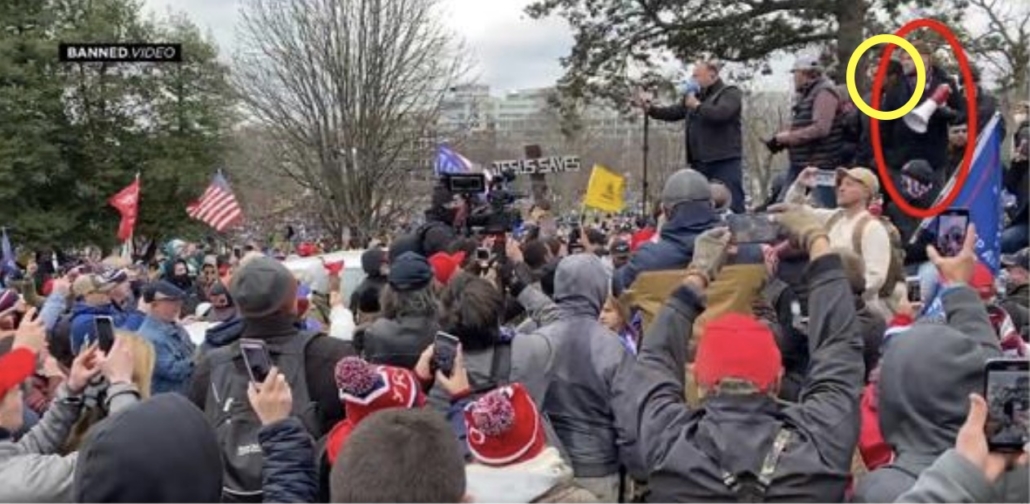
[yellow circle marking Alexander added]
The government doesn’t note it, but January 6 trespasser Stacie Getsinger did on Facebook: while at that non-permitted spot, Jones promised the mob that if they followed him to the East side of the Capitol, they’d get to hear Trump speak again.
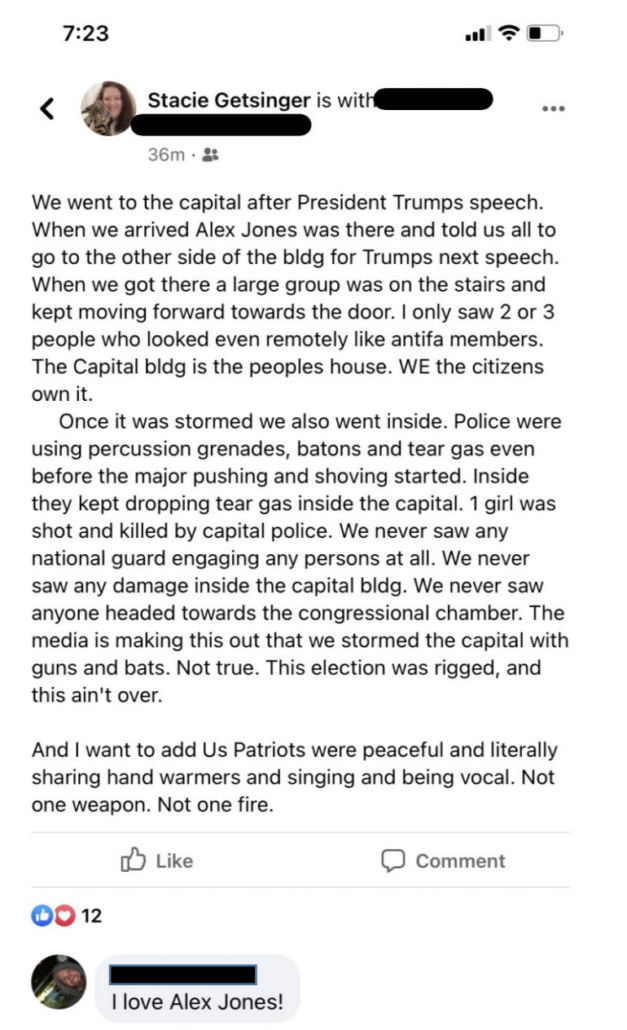
Only after promising the mob they’d get to hear Trump did Jones’ handlers attempt to get sanction to go to the East side of the building by promising to de-escalate the riot that they had intentionally led more people to. As the government interprets the video that Shroyer himself provided, when Jones’ bodyguard offered to help de-escalate, the cop pointed northeast, which happens to be where Alexander had a permit and a stage already set up, at the “Lot 8” that Alexander claims they weren’t permitted to use.
INDIVIDUAL: I’m with [Jones], man. I’m telling you right now, he just tried to deescalate this stuff. If we can talk to someone and get him up there, we can get them to back off.
OFFICER: Take it over to the east, the east front’s the problem now. *Pointing east.*
INDIVIDUAL: This is the problem? *Pointing east.*
OFFICER: East front is the problem now.
INDIVIDUAL: Ok, so we need to get him up there and tell people to …
OFFICER: The east front is the problem now.
INDIVIDUAL: Alright, is there a way that we can get him to a position …
OFFICER: Through the hole, through the hole that you guys breached right there *Pointing northeast away from the Capitol Building.*
INDIVIDUAL: We didn’t breach anything.
OFFICER: Well, the whole group that was with you guys.
INDIVIDUAL: We’re just trying to help.
OFFICER: Out through there, all the way out there, take him up there. *Pointing northeast, away from the Capitol Building.* [my emphasis]
That is, this cop specifically told Jones and his entourage, including Alexander, to go to the area where Alexander had a permit (albeit for dozens, not thousands, of people). Instead of going in that direction, they instead circled around close to the Capitol, stepping over barricades and an “Area Closed” sign.
As the defendant and his group curved around the Capitol Building, the body-camera individual stated, “Here’s an opening right here.” The defendant and his group then walked toward where the body-camera individual pointed, passing downed and moved temporary barricades and stepping over at least one fallen sign that appeared to read “Area Closed,” as seen below circled in red.
When Jones’ bodyguard again asked for sanction to trespass in the area where they didn’t have a permit, the cops walked away.
The body-camera individual continued to yell that [Jones] could deescalate the situation, begging them to let Person One speak to the crowd. The two officers speaking then walked away and out of sight. The body-camera individual exhorted, “Nah, that’s not good, dude. That’s not good. That’s fucked. That’s fucked. No way. No fucking way. No way.”
After being told to pull the crowd away towards where Alexander had a permit, but instead deciding to go speak where he didn’t, Jones’ bodyguard acknowledged they might get in trouble for doing so.
The body-camera individual then walked back toward the defendant’s group and asked, “Just get him up there? Hey, Tim, just get him up there? Just do it? But we know we might catch a bang or two.”
And then, after the entourage joined former Jones’ staffer Joe Biggs and the advance guard of the Oath Keepers at the top of the East steps, Jones and Shroyer — still with Alexander present — called for revolution.
Once the defendant and others nearly reached the top, he began to use his megaphone to lead the large crowd in various chants, including “USA!” and “1776!”—again, a reference to revolution.
While, before Jones lured more mobs to the East side of the building, he did call people to stand down, once he got to the East steps, he further riled the crowd. As the government notes sardonically, calling for revolution “does not qualify as deescalation.”
Even assuming the defendant’s argument is true and the defendant received permission to go to the Capitol steps for the limited purpose of deescalating the situation, the defendant did not even do that. Quite the opposite. Despite the defendant’s arguments today that “Shroyer did nothing but offer his assistance to calm the crowd and urge them to leave United States Capitol grounds,” Dkt. 8-1 at 14, the defendant himself said otherwise in an open-source video recorded on August 21, 2021: “From the minute we got on the Capitol, the Capitol area, you [referring to Person One] started telling people to stand down, and the second we got on there, you got up on stacks of chairs, you said, ‘We can’t do this, stand down, don’t go in.’ … And I’m silent during all of this” (emphasis added).11 Moreover, as seen in other videos and described above, the defendant forced his way to the top of Capitol Building’s east steps with Person One and others and led hundreds of other rioters in multiple “USA!” and “1776!” chants with his megaphone. Harkening to the last time Americans overthrew their government in a revolution while standing on the Capitol steps where elected representatives are certifying a Presidential Election you disagree with does not qualify as deescalation.
Had Ali Alexander and Alex Jones taken the crowd they had led to the riot, like Pied Pipers, to Demonstration Area 8 (per the permits that BuzzFeed liberated), which is roughly where the cops directed them to go, and which is where they had a stage and a sound system, they might have prevented, or at least mitigated, the breach of the East front.
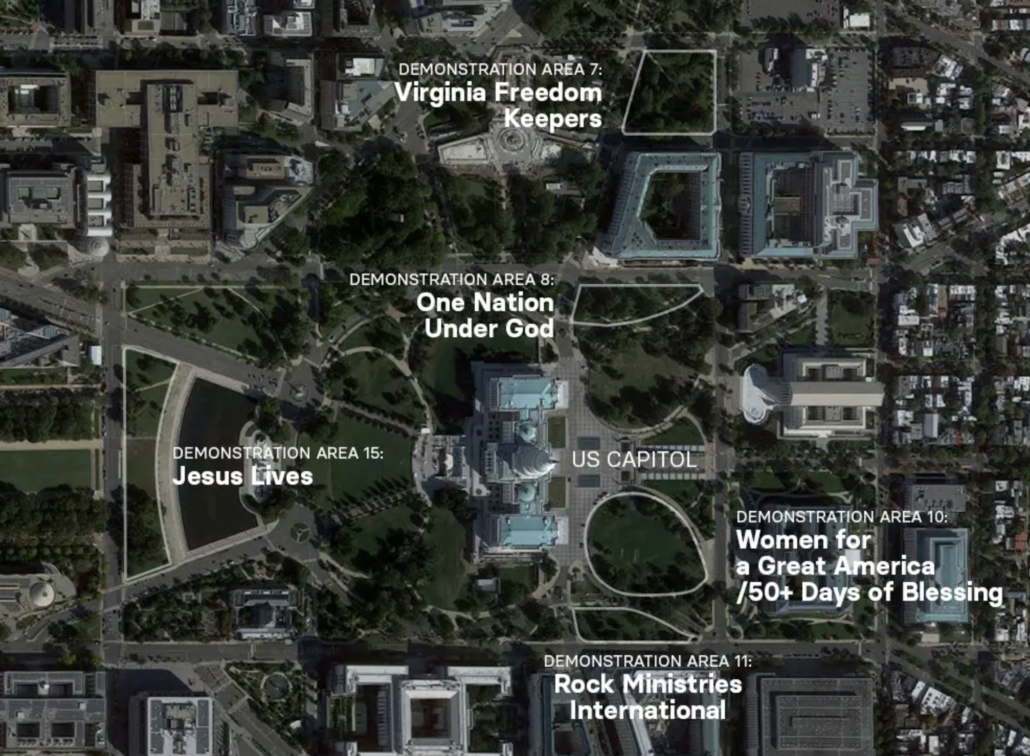
Instead, Alexander’s entourage joined their militia allies on the East steps and incited revolution, just moments before some of those militia members forcibly opened a second breach into the Capitol.
Alexander’s real goal, in testifying to the committee (rather than pleading the Fifth, which would be the smart thing to do) may be to learn what the Committee knows, while pretending that his cooperation — which has taken two months, not two weeks — is voluntary, not legally mandated.
In closing, I want to reiterate my posture of compliance. Over the past few weeks, I have spent more than 100 hours personally searching through my archives looking for relevant and responsive documentation to this committee’s requests. I’ve probably spent another 100 hours preparing to answer your questions. I have hired attorneys and computer consultants to be as responsive as possible and provide as much as I could find within the short amount of time I had to produce documents.
I did all of this despite not being accused of a crime. I did all of this despite being a private citizen with Constitutional rights protecting me from unreasonable searches and seizures and without a warrant entitling anyone to the documents I’ve voluntarily provided. It’s prevented me from working. It’s prevented me from sleeping, at times. It’s been extremely difficult and burdensome.
But I am voluntarily here to do the patriotic thing.
If this committee thinks of anything I haven’t turned over to which you believe I may have access, I ask you please to let me know and help refresh my memory. [bold my emphasis, italics Alexander’s emphasis]
When Stone tried to avoid telling the truth to Adam Schiff four years ago, when he actually hadn’t yet received a subpoena, it still led to his prosecution for multiple false statements. Here, Alexander is simply pretending he hasn’t been subpoenaed to appear.
Alexander will be represented today by, among others, Paul Kamenar, the lawyer who — after Roger Stone learned that his former aide had provided damaging information to the FBI — appealed Andrew Miller’s subpoena to testify to Mueller’s grand jury to the DC Circuit, thereby stalling until after the Mueller Report was done. Immediately after the trial was done, Stone hired Kamenar, presumably to learn what Miller had said in subsequent FBI interviews.
That raises real questions about whether Alexander is repeating Stone’s colossally stupid approach to the Russian investigation for his own benefit, or for Stone’s.


